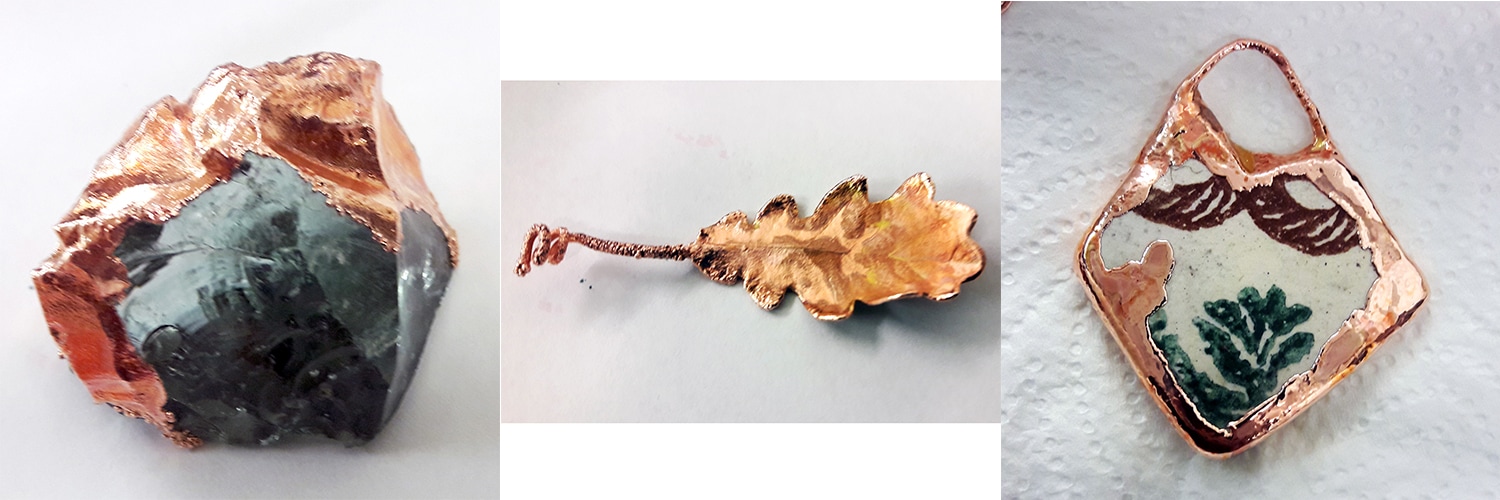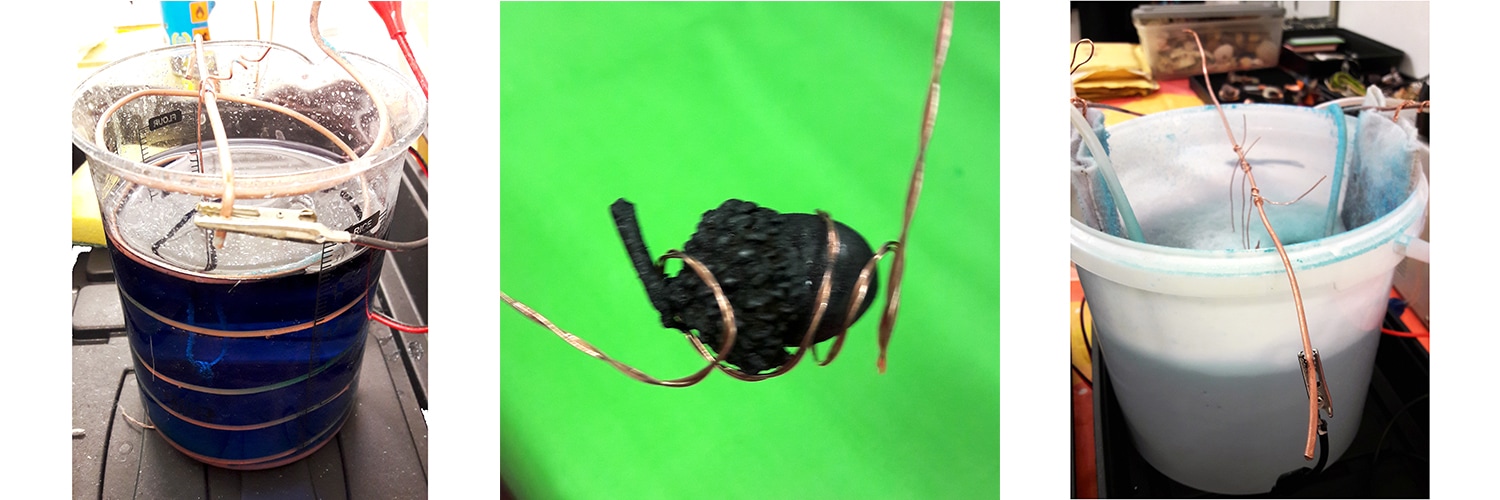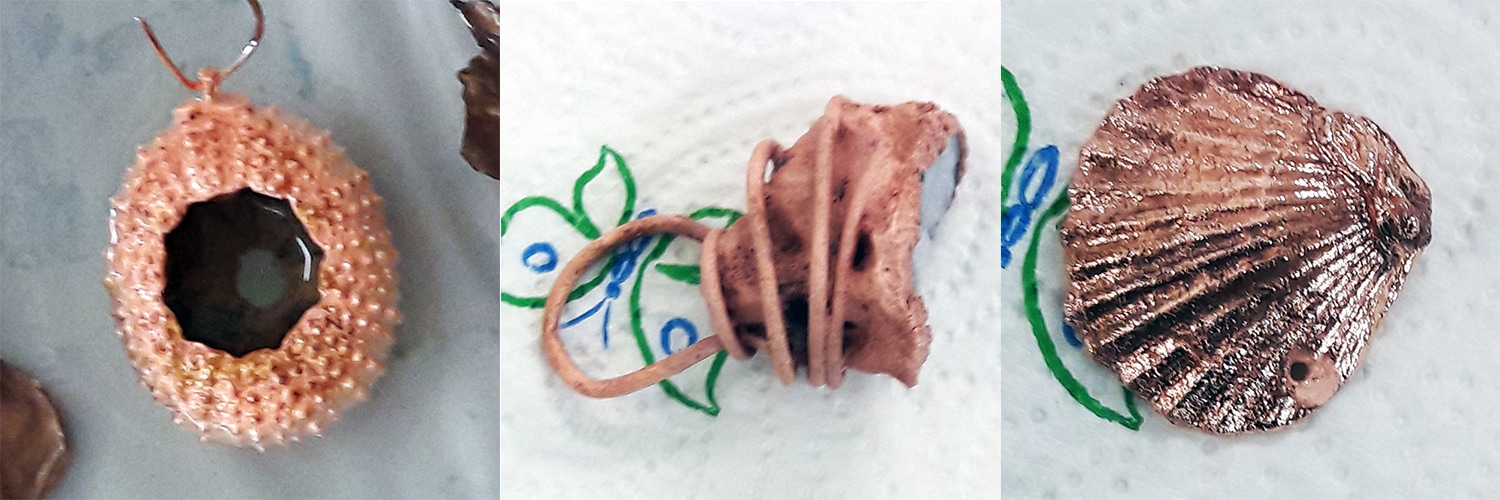I teach a range of jewellery making short courses in my central London workshop - this month I would like to share more about the electroforming course I offer.
This course is running next on the 6 & 7 April 2017, and then again on the 9 & 10 June. The course costs £210 for the 2 day course and this includes all materials.
This course is running next on the 6 & 7 April 2017, and then again on the 9 & 10 June. The course costs £210 for the 2 day course and this includes all materials.
What is electroforming?
Electroforming is a way of depositing metal particles onto the surface of another item. The process can be used to either entirely coat a master model (eg a wax carving) to create a strong but lightweight metal form (allowing larger scale work than would be practical to cast in solid metal for example), or to add metal highlights onto a non-metallic object.
In my work as an artist / designer, I use electroforming to add contrasting elements, to add metal forms into designs that use other materials as well. For example; I create metal highlights onto hand carved stones, I use electroforming to combine with beadwork or to blend and hold a stone into place on a fabricated metal form.
In this course we will be working with copper - growing copper onto non-metallic objects such as stones, leaves, twigs, glass, ceramic items, gems, and more.
Electroforming is a way of depositing metal particles onto the surface of another item. The process can be used to either entirely coat a master model (eg a wax carving) to create a strong but lightweight metal form (allowing larger scale work than would be practical to cast in solid metal for example), or to add metal highlights onto a non-metallic object.
In my work as an artist / designer, I use electroforming to add contrasting elements, to add metal forms into designs that use other materials as well. For example; I create metal highlights onto hand carved stones, I use electroforming to combine with beadwork or to blend and hold a stone into place on a fabricated metal form.
In this course we will be working with copper - growing copper onto non-metallic objects such as stones, leaves, twigs, glass, ceramic items, gems, and more.
What does the course cover?
The first morning covers preparation and setup -
We start the course with how to prepare objects for electroforming, using sealants and then conductive paints, safe use of these and the key practical considerations for the most successful results.
Once the pieces are prepared, we cover setting up a simple, basic kit that is practical and affordable for electroforming at home or in a small workshop.
The course then takes a break, I run the tanks and check on them every hour over the afternoon and the next morning. It takes a while to grow a substantial layer of metal, so the class continues on the afternoon of the second day.
On the second day we cover working with the completed pieces plus kit storage and maintenance -
We start by going over all the pieces that have been formed - what worked best, what might not have worked so well, and what could have caused this / how to improve it.
We look at refining, finishing and using the formed pieces - what can and can't easily be done with them.
We also cover how to safely store the chemicals and kit and how to maintain the liquid and materials for future use.
The first morning covers preparation and setup -
We start the course with how to prepare objects for electroforming, using sealants and then conductive paints, safe use of these and the key practical considerations for the most successful results.
Once the pieces are prepared, we cover setting up a simple, basic kit that is practical and affordable for electroforming at home or in a small workshop.
The course then takes a break, I run the tanks and check on them every hour over the afternoon and the next morning. It takes a while to grow a substantial layer of metal, so the class continues on the afternoon of the second day.
On the second day we cover working with the completed pieces plus kit storage and maintenance -
We start by going over all the pieces that have been formed - what worked best, what might not have worked so well, and what could have caused this / how to improve it.
We look at refining, finishing and using the formed pieces - what can and can't easily be done with them.
We also cover how to safely store the chemicals and kit and how to maintain the liquid and materials for future use.
- This course next runs on 6-7 April, then again on 9-10 June.
- This course is held in my central London workshop - just near Farringdon Station.
- The price for the two days is £210 per person, and this includes all materials and everything you need.
- Bookings can be made on my website at - http://www.pennyakester.co.uk/store/c5/Jewellery_Courses.html
- If you have any questions about the course - do add a comment here, or get in touch by e-mail




 RSS Feed
RSS Feed